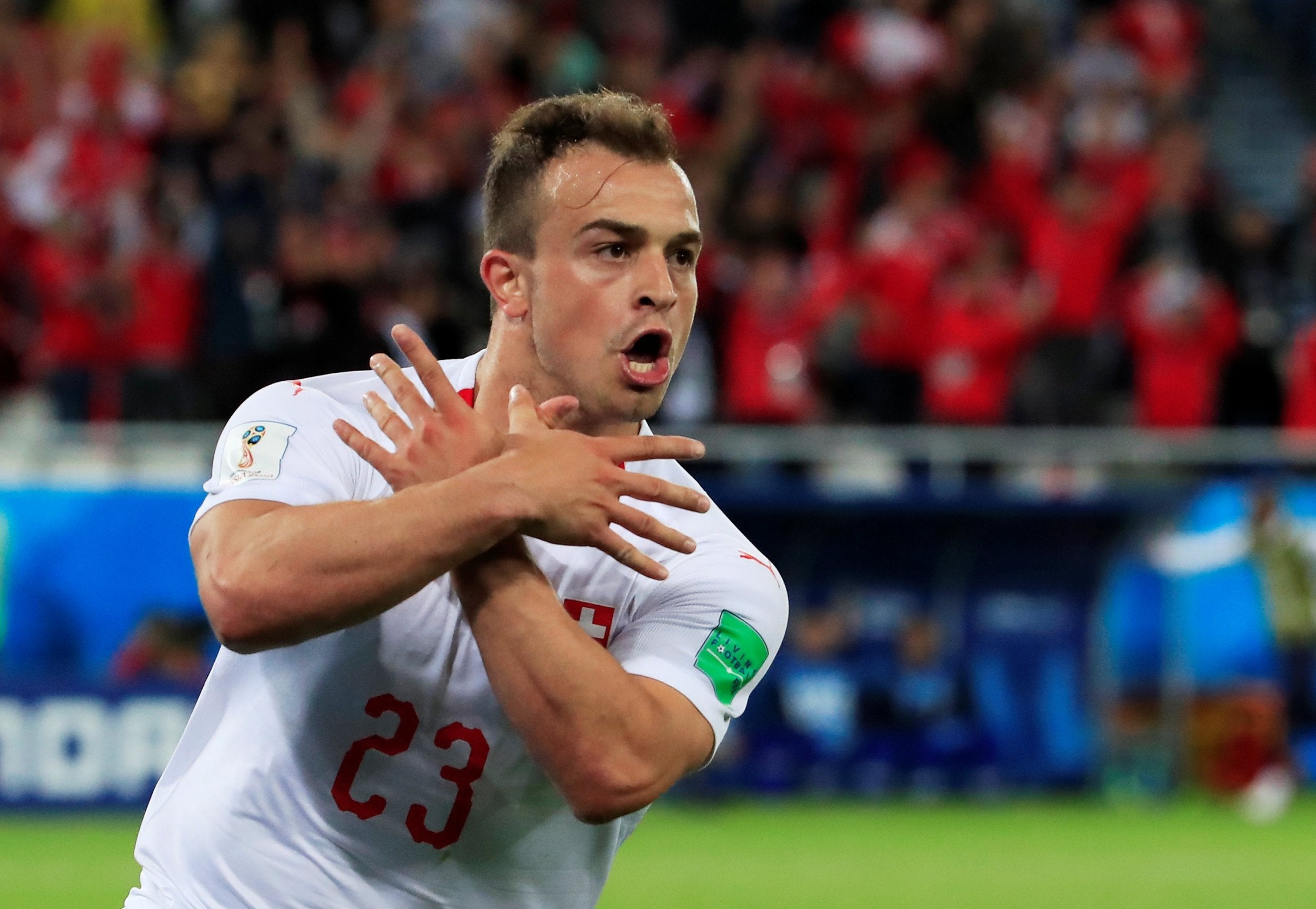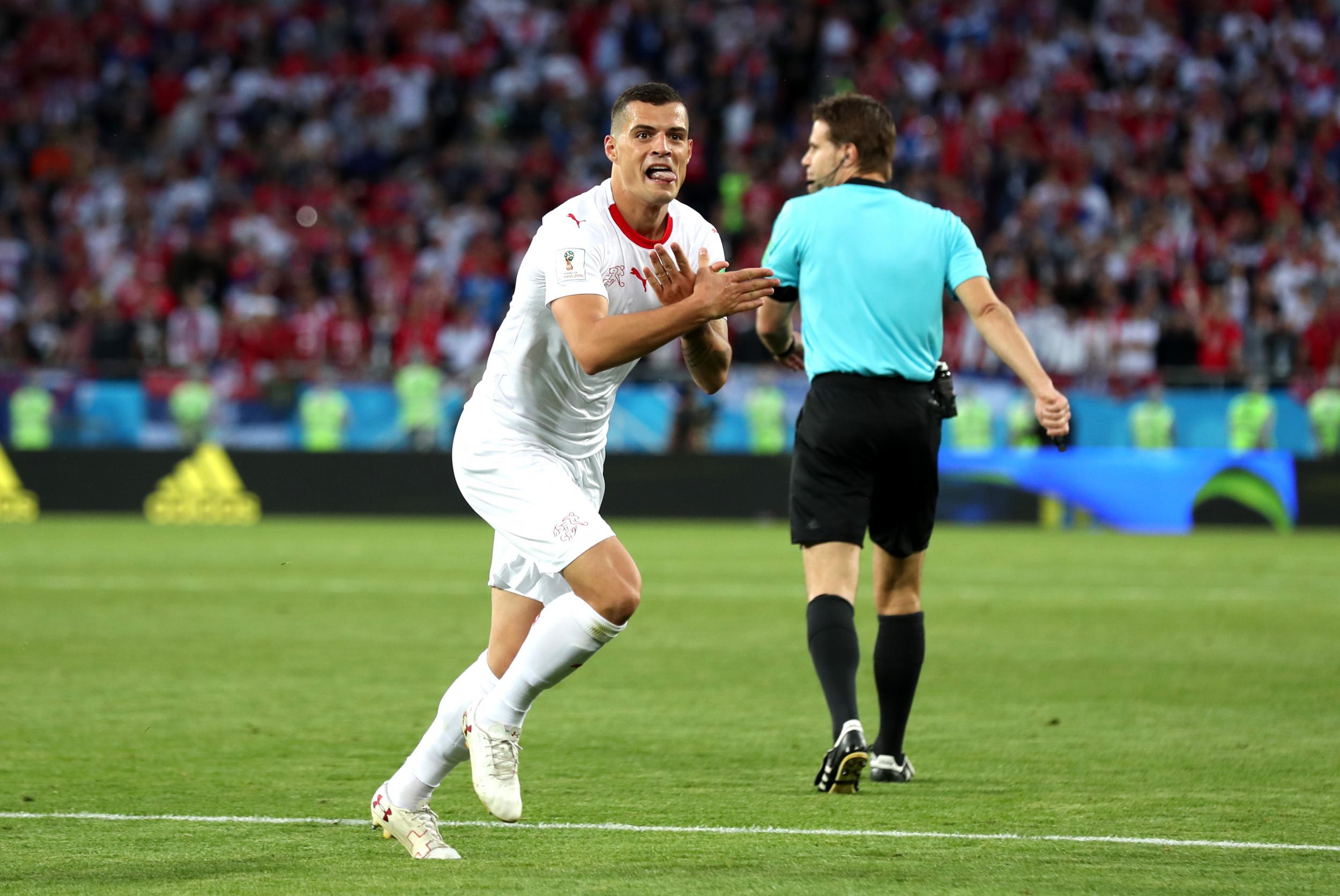World Cup 2018: Xherdan Shaqiri plays down political furore after celebrating ‘beautiful’ goal with pro-Albanian sign
Addressing his celebrations after hitting the winning goal against Serbia, the winger said: 'It was just a game, perhaps it was a very important game, but it was beautiful to score'

Your support helps us to tell the story
From reproductive rights to climate change to Big Tech, The Independent is on the ground when the story is developing. Whether it's investigating the financials of Elon Musk's pro-Trump PAC or producing our latest documentary, 'The A Word', which shines a light on the American women fighting for reproductive rights, we know how important it is to parse out the facts from the messaging.
At such a critical moment in US history, we need reporters on the ground. Your donation allows us to keep sending journalists to speak to both sides of the story.
The Independent is trusted by Americans across the entire political spectrum. And unlike many other quality news outlets, we choose not to lock Americans out of our reporting and analysis with paywalls. We believe quality journalism should be available to everyone, paid for by those who can afford it.
Your support makes all the difference.Xherdan Shaqiri left Kosovo before he was old enough to talk but Kosovo has never left him. When he was growing up in a village near Basel, his parents, who had taken him to Switzerland as a baby when Yugoslavia broke bloodily apart, taught him about where he had come from.
Before the World Cup, which would pitch him against a Serbian team in a stadium where his every touch was jeered by a fiercely-partisan crowd, he said of his home that tore itself away from Serbian rule: “I never forget that I was born in Kosovo.
“It is a very, very poor country, there is not much work and not much money. My family did not have much. My uncle’s house burned down and ours was left standing but everything had been stolen or broken and the walls were sprayed.”
On the football pitch, near his home in Augst, a village where most vote for the anti-immigration Swiss People’s Party, he would have dreamed of this moment; playing against Serbia, one-on-one with the keeper in the 90th minute. This to win. One boot had the Swiss flag stitched into it, the other the Kosovan. He scored with the Swiss.
“What was going through my mind? Just to score,” Shaqiri said afterwards. “I wasn’t nervous. Did I look nervous? I was very cool. It was important for me to score and it was a beautiful moment.” Then he added shyly: “It was just a game, perhaps it was a very important game, but it was beautiful to score.”
There were reasons why Shaqiri, with microphones pushed towards him, was anxious to point out that ‘it was just a game’. After he scored, he dashed towards the Swiss supporters, making the sign of the Albanian double-headed eagle.
When Granit Xhaka, who like Shaqiri is of Kosovan descent, scored the equaliser, he too made the sign. Xhaka, like Shaqiri, played his early football in Basel. Unlike Shaqiri, he was born there but he also grew up steeped in the politics of Kosovo. In 1986, when Yugoslavia was still a Communist state, his father, Ragip, was sentenced to three-and-a-half years in prison for Kosovan self-determination.
The double-headed eagle appears on the Albanian rather than the Kosovan flag but it is a symbol for all those who are of Albanian descent, who in Yugoslavia and later in Serbia, were at the back of the queue when it came to the good things in life.
In the aftermath of the 2-1 win in Kaliningrad that gave Switzerland a fabulous chance of progressing from a fearsome-looking group, Shaqiri, clutching his man-of-the-match award, was reluctant to talk about politics, lest it incur the wrath of Fifa who may fine him and Xhaka.

“I can’t discuss the gesture I am afraid. We are footballers not politicians,” he said. “All I can say is that I scored a goal I am proud of. We can’t discuss anything else. Emotions sometimes take over footballers and there was a lot of emotion out there. To score a goal like that – it is very difficult to keep your emotions under check.”
His captain, Stephan Lichtsteiner, felt more able to discuss it. “Why not?” he said when asked about the gestures. “This was about history for them. This is more than football. They had this war that gave both of them big problems.
“I understand them and I think it is a normal part of their life. There was also big provocation from Serbia before the match.”
Back in Switzerland, in the aftermath of Friday’s match, Xhaka and Shaqiri found themselves the subject of embarrassment as well as pride. Switzerland has always been a nation of refugees but they have preferred their refugees to have money and keep a low profile.

The country’s biggest-selling paper, Blick, called Shaqiri and Xhaka: “smiling idiots”. The national team, whose ranks are packed with football refugees from what used to be Yugoslavia, tried to persuade its players not to use the double-headed eagle sign four years ago, when tensions over immigration were rising and the Swiss People’s Party was making big gains.
Shaqiri and Xhaka knew exactly what kind of reception they would receive in Kaliningrad, where the Serbs received almost automatic support from the Russians in the crowd. During the game, Shaqiri had been swatted aside by Aleksandar Mitrovic, whose opening goal after five minutes suggested Serbia would win easily. As the match wore on and the game slid away from the Serbs, the Fulham striker became increasingly agitated.
“I didn’t understand what he said to me,” Shaqiri remarked. “Maybe he spoke Serbian. I had already told him to keep calm and do his job – I know him from England. Of course, the Serbian fans were whistling. We knew it was going to come but we kept calm.”
Join our commenting forum
Join thought-provoking conversations, follow other Independent readers and see their replies
Comments